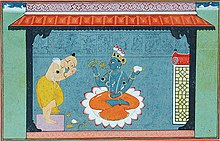Yadavabhyudaya
| Yadavabhyudaya | |
|---|---|
 Late 18th century painting of the wedding of Krishna and Rukmini | |
| Information | |
| Religion | Hinduism |
| Author | Vedanta Desika |
| Language | Sanskrit |
| Chapters | 24 |
The Yadavabhyudaya (Sanskrit: यादवाभ्युदयम्, romanized: Yādavābhyudayam) is a Sanskrit mahakavya (epic poem)[1] by the Hindu philosopher Vedanta Desika.[2] Written in the fourteenth century CE,[3] the work consists of 24 cantos that describe the life of Krishna as well as the lineage of the Yadava race.[4]
The Yadavabhyudaya is regarded to be a significant work of medieval Sanskrit poetry.[5] It holds the rare distinction of being offered a flattering commentary by the philosopher Appayya Dikshita, who belonged to the Advaita school of thought; the poet Vedanta Desika himself was a proponent of the rival Vishishtadvaita philosophy.[6]
Content
[edit]| Part of a series on |
| Vaishnavism |
|---|
 |
Indologist Edwin Bryant describes the Yadavabhyudaya to be an "encyclopedic treatment of the Krishna-katha (narrative) and lila (divine "play")". The themes of love and separation, heroism, eroticism, and various forms of rasa (aesthetic experience) are combined in the poem to describe the story of the deity. The poem begins with a number of laudatory stotras (eulogies).[7] The first few cantos narrate the pregnancy of Devaki, Krishna's mother, the birth of the deity, and his arrival to Gokulam. The defeat of Putana, Keshi, Kaliya, as well as other malicious beings are recounted. The fifth and the sixth cantos offer an illustration of the seasons and sacred imagery. The seventh and the eighth cantos relate the legend of Krishna lifting the hill Govardhana and his rasa-lila, his dance with the milkmaids called the gopis. The poem then describes the arrival of Akrura and Krishna's journey to Mathura, where he slays his tyrannical uncle Kamsa. The legends of his kingship in Dvaraka, his marriage to Rukmini and Satyabhama, the vanquishing of Narakasura, the stealing of the parijata tree, and his royal progress are detailed. A brief account of the Kurukshetra War and the deity's preaching of the Bhagavad Gita is offered. The final canto describes the deity's life as an ideal householder with his numerous queens at Dvaraka.[8][9][10]
Hymn
[edit]The traditional first propitious hymn of the work, called the mangalashloka, venerates Krishna:[11]
vande bṛndāvana vallavī janavallabham
jayantī sambhavam dhāma vaijayantī vibhūṣaṇam
To the one born on the occasion of Jayanti, the one who moves freely around Vrindavana, the darling of the gopis, the one who is adorned by the Vaijayanti, I offer my salutations
This hymn was originally featured in one of the author's other works on Krishna, the Gopalavimshati.[12]
See also
[edit]References
[edit]- ^ Garg, Gaṅgā Rām (1992). Encyclopaedia of the Hindu World. Concept Publishing Company. p. 58. ISBN 978-81-7022-374-0.
- ^ Chari, S. M. S. (1 January 2018). Vaisnavism: Its Philosophy, Theology and Religious Discipline. Motilal Banarsidass. p. 28. ISBN 978-81-208-4135-2.
- ^ Kṛṣṇamācāryar, M. (1906). A History of the Classical Sanskrit Literature. Vaijayanti Press. p. 123.
- ^ Division, Publications. INDIA: SOCIETY RELIGION AND LITERATURE IN ANCIENT AND MEDIEVAL PERIODS. Publications Division Ministry of Information & Broadcasting. p. 120. ISBN 978-81-230-2191-1.
- ^ Gaidbani, R. N. (1946). "Review of THE YADAVABHYUDAYA OF ŚRI VEDĀNTĀCĀRYA WITH THE COMM. OF APPAYYA DĪKṢITA. Published by University of Mysore Oriental Library Publications Sanskrit Series. 86". Annals of the Bhandarkar Oriental Research Institute. 27 (1/2): 170. ISSN 0378-1143. JSTOR 41784892.
- ^ Yadavabhyudayam of Vedanta Desika (2 PDFs) (in Sanskrit).
- ^ Makarand Joshi. Yadavabhyudaya By Vedanta Desika English Translation.
- ^ Bryant, Edwin Francis (2007). Krishna A Sourcebook. Oxford University Press. p. 290.
- ^ Padmaja, T. (2002). Temples of Kr̥ṣṇa in South India: History, Art, and Traditions in Tamilnāḍu. Abhinav Publications. p. 75. ISBN 978-81-7017-398-4.
- ^ N. V., Vasudevachariar (1992). Yādavābhyudaya Mahākāvya of Śrī Vedāntadeśika, a Study. K.C. Publishers.
- ^ Makarand Joshi. 3 Great Epic Creations Of Sri Vedanta Desika K R Krishna Swami 2005 OCR. p. 61.
- ^ Dr.Satyavrata Singh (1958). Vedanta Desika. p. 55.
